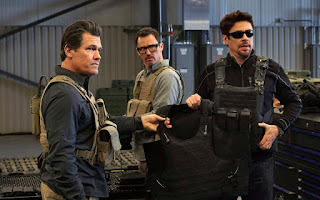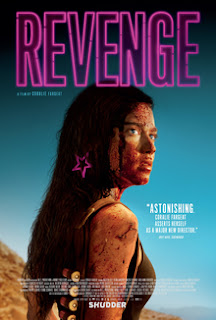"You Wanna See This Thing Through? I'm Gonna Have To Get, Dirty..."
With Denis Villeneuve showing a wider audience what was to come of his expert film-making prowess back in 2015 with Sicario, a expertly crafted, white-knuckle thriller which laid the basis for the similarly masterful Arrival and Blade Runner 2049 in terms of what the French-Canadian could achieve with the right backing, arguably the more impressive element of the feature was Taylor Sheridan, an American most famous at the time for his stint on Sons of Anarchy but whose screenplay for Sicario was both smart and compelling, one swiftly followed by equally impressive screenplays for both Hell or High Water and Wind River, capping off a trio of superbly written movies. each with a dedicated lust for heavy doses of substance and style in equal measure. Returning to writing duties again for the eagerly anticipated Sicario sequel, subtitled Soldado, the absence of Villeneuve means Italian director Stefano Sollima (Suburra) takes charge of a movie which continues the oppressive, ominous tone of the original whilst working through a genuinely thrilling narrative, one which sees the return of Josh Brolin (Avengers: Infinity War) and Benicio del Toro (Star Wars: The Last Jedi) as Matt Graver and Alejandro Gillick as they attempt to orchestrate a war between the Mexican cartels after they are seen to be aiding agents of ISIS cross the border in order to carry out their destructive message, and whilst Soldado doesn't entirely hit the heavy heights of its' near-perfect predecessor come the end credits, Sollima's movie is still an unnerving, powerful work of war at its' most darkest and lawless.
Beginning with a catalogue of terrorist related events, including a jaw-dropping and horrific supermarket explosion in which the camera lingers closely from outside through every familiar step of contemporary terror, Soldado quickly re-introduces the reunion of Graver and Gillick as they are handed the freedom to do as they please in order to combat the ever-increasing Mexican cartel presence on the US-border which has now taken extra precedence due their involvement in potential terror activities. With a central narrative which sees the kidnapping of the young, spoiled daughter of a renowned Mexican cartel boss, one which ultimately results in in-house allegiances being put to the test, Sheridan's screenplay also follows closely the exploits of newcomer Elijah Rodriguez's Miguel as he crawls up the ranks of the cartel's people smuggling operation, and whilst the sequel doesn't entirely hit the brooding, ambiguity which drove through the entirety of its' predecessor up until the very end, the tight-knit, unbearable tension does manage to completely follow over, rearing its' head throughout a high proportion of a movie which aside from one sarcastic aside, primarily holds its' tone as completely and utterly serious. With a Michael Mann-esque, militaristic sensibility which sees countless shots of rampaging army vehicles cruising across the vacant, perilous landscapes of the US/Mexican border, Soldado is wickedly spectacular in its' approach to action set pieces, with the piercing sound of bullets echoing the overripe mixing of Christopher Nolan's Dunkirk merging spectacularly with endless cinematic screenshots of whirring helicopters, over-head drones and enough firepower to start and end a small coup.
With the inclusion of much more lusciously orchestrated action scenes second time around, the question remains whether the overall screenplay deserves such luxuries, and even as an overall body of work Soldado doesn't piece together as tightly or rigidly as Sicario, with particular crucial plot threads concluding rather suddenly without any real sense of full-blooded purpose, the avenues which Sheridan's writing takes us undoubtedly suits the bleak mould of the series, particularly in the movies' penchant for gut-wrenching murder sequences and a concluding near-death experience which undeniably ranks up there with one of the more brutal character arcs in recent history. With Brolin and del Toro on superb, angst-ridden, macho-growling form, with the latter having much more space for a deeper layer of examination this time around as his character's uncertain, ambiguous nature is slowly scraped at and given light, young Isabela Moner (Transformers: The Last Knight) as the similarly tough Isabela Reyes gives an equally impressive performance as the daughter of the cartel boss responsible for the death of Alejandro's wife and daughter. With a bruising, battling, war torn sensibility which is as tough at times as it is riotously engaging and enjoyable, Soldado is a sequel success story which both pays homage to its' predecessor with utmost respect whilst developing its' characters in fascinating ways, and with the possibility of a third film coming to nicely round the series off as a trilogy, one can only query how much further Sheridan can continue his winning scripture streak.























